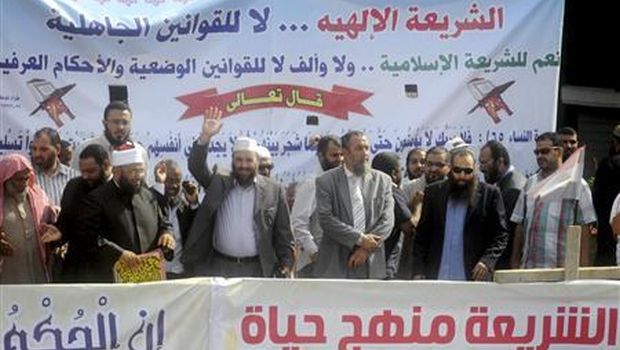
Egyptian Islamist leader Tareq Al-Zumar waves to demonstrators while speaking during a protest by hundreds of Salafists calling for the enforcement of the Islamic Shari’a at Tahrir Square in Cairo, Egypt, on November 9, 2012. (Reuters/Mohamed Abd El Ghany)
Cairo, Asharq Al-Awsat—Egypt’s Islamists will face a tough test at parliamentary elections expected later this year amid growing public anger toward the Islamist trend and increasing inter-Islamist divisions following the ouster of former Islamist president Mohamed Mursi last July and the blacklisting of the Muslim Brotherhood.
Islamists can expect to win no more than one-third of seats at the next parliamentary elections, according to political experts, in contrast to the 70-percent majority secured by Islamist parties at the last elections.
Speaking to Asharq Al-Awsat, Dr. Amr Hashim Rabi, head of the Egyptian Studies Unit at the Al-Ahram Center for Political & Strategic Studies, said he expected a sharp fall in the number of seats that will be won by the Islamist trend at the next parliament, blaming this on the “disasters” that occurred during Mursi’s one-year rule. He said he expected that all Islamists—political parties and independent candidates—would likely win between one-fifth and one-third of total seats.
Rabi said he expects the next polls to witness a “bone-breaking battle” between Egypt’s various Islamist trends in a fight to secure the votes of dwindling supporters. He added that the outlawed Muslim Brotherhood could seek to field lesser-known independent figures loyal to the group or field candidates under the umbrella of other Islamist parties, such as the moderate Strong Egypt party or the Salafist-oriented Al-Watan party.
“Ordinary Egyptians do not differentiate between the Brotherhood and other Islamist groups. Therefore, there will be a decline in support for the entire Islamist trend and not only for the affiliates of the Brotherhood, as they all [constitute] one trend in the eyes of Egyptians,” Rabi said.
Dr. Najih Ibrahim, a former Al-Gama’a Al-Islamiyya leader, said he expected most Islamist parties to seek to contest the next parliamentary polls.
“There are parties that will definitely run, such as the Salafist Nour, Al-Watan, Strong Egypt and Construction and Development parties,” Ibrahim told Asharq Al-Awsat.
The majority of Egypt’s Salafist political parties—rivals to the homegrown Muslim Brotherhood organization—implicitly backed the ouster of Mohamed Mursi in July 2013, with the Nour Party giving explicit support to the move.
The Brotherhood will likely seek to contest the parliamentary elections “on an individual basis, through the fielding of unknown figures loyal to the Brotherhood, or through joining some parties to boost their chances,” Ibrahim said.
“The Nour Party will face fiercer competition from the Brotherhood and its supporters than [the competition] it will face from liberal and socialist parties, because the Brotherhood will be keen to destroy the Nour Party and tarnish it owing to the political feud between the two sides,” he added.
“All forces of the Islamist trend will participate, but I do not expect they will win more than 12 percent of the seats,” the former Al-Gama’a Al-Islamiyya leader said.
The leader of the Nour Party, Younes Makhioun, expressed hope that his party would win the same share of seats it held in the last parliament—around 20 percent. The Nour Party, now Egypt’s strongest Islamist political party following the outlawing of the Brotherhood, is hoping its public backing of popular Egyptian President Abdel-Fattah El-Sisi will help consolidate its political grip.
“But the difficult conditions and the suffering of the Islamist trend because of the failure of the Brotherhood and its wrong practices and what they have done so far will definitely have a negative impact on the popularity of the Islamist trend in general,” Makhioun told Asharq Al-Awsat.
“We are confident about the popularity of the Nour Party, and many Egyptians support us, particularly because of our stance against the Brotherhood and its mistakes and our stand in favor of the stability of the country and its interests,” he added.
